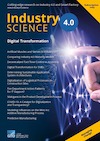Search


Bibtex
Cite as text
@Article{Grum+Korjahn,
Cite-key = "Grum2023Art",
Year= "2023",
Number= "1",
Volume= "Industry 4.0 Science 39",
Pages= "100-105",
Journal = "Industry 4.0 Science",
Title= "Artificial Intelligence in ERP Systems – Development Potential and Benchmarking",
Author= "Marcus Grum and Nicolas Korjahn, University of Potsdam",
Doi= "https://doi.org/10.30844/I4SE.23.1.100",
Abstract= "The use of artificial intelligence (AI) is becoming more important for a variety of industries, which is why enterprise resource planning (ERP) systems also offer many possible uses of AI. Due to their newly acquired, AI-based adaptability and learning abilities, modern AI-integrated ERP
systems are able to develop competencies, plan processes, make forecasts and interact intelligently with humans. It is not uncommon for such systems to initiate major structural changes for companies and to open up new
markets and design areas [1]. In order to measure the progress of an ERP system in terms of AI, the Center for Enterprise Research (CER) has developed an AI maturity model. Building on this model, a tool for evaluating AI integration in an ERP system should be able to showcase potential for development and enable market comparison.",
Keywords= "artificial intelligence, enterprise resource planning, maturity model, AI, ERP, CER, AI maturity model, ERP market comparison, Asseco, APplus",
}
Marcus Grum and Nicolas Korjahn, University of Potsdam(2023): Artificial Intelligence in ERP Systems – Development Potential and Benchmarking. Industry 4.0 Science 391(2023), S. 100-105. Online: https://doi.org/10.30844/I4SE.23.1.100 (Abgerufen 23.02.26)
Open Access
Abstract
Abstract
The use of artificial intelligence (AI) is becoming more important for a variety of industries, which is why enterprise resource planning (ERP) systems also offer many possible uses of AI. Due to their newly acquired, AI-based adaptability and learning abilities, modern AI-integrated ERP systems are able to develop competencies, plan processes, make forecasts and interact intelligently with humans. It is not uncommon for such systems to initiate major structural changes for companies and to open up new markets and design areas [1]. In order to measure the progress of an ERP system in terms of AI, the Center for Enterprise Research (CER) has developed an AI maturity model. Building on this model, a tool for evaluating AI integration in an ERP system should be able to showcase potential for development and enable market comparison.
Keywords
Schlüsselwörter
artificial intelligence, enterprise resource planning, maturity model, AI, ERP, CER, AI maturity model, ERP market comparison, Asseco, APplus
References
Referenzen
[1] Grum, M.; Körppen, T.; Lauppe, H.; Korjahn, N.; Gronau, N.: Entwicklung eines KI-ERP-Indikators – Evaluation der Potenzialerschließung von Künstlicher Intelligenz in Enterprise-Resource-Planning-Systemen (2022).

 English
English